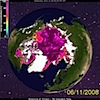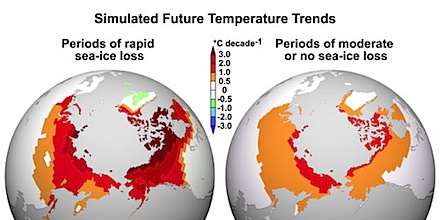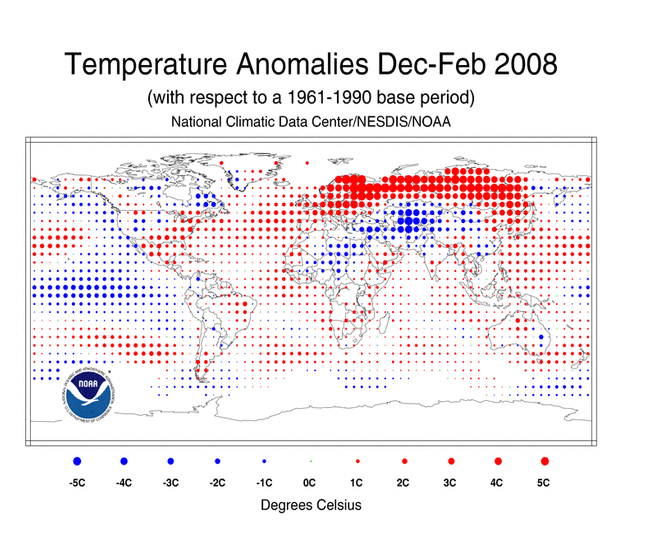 For REM, it “starts with an earthquake, birds and snakes, an aeroplane“, for us, it looks like diminishing Arctic sea ice is the sign. Over at Open Mind, the blogger formerly known as Tamino looks in some detail at the sea ice/rapid warming paper I linked to yesterday. His post makes for sober reading. David Lawrence and his team at NCAR and the NSIDC examined runs of the NCAR-based CCSM climate model that included episodes of rapid sea ice loss, and looked at what happened to climate of the Arctic during those periods. They found that the rate of warming increased 3.5 times faster than the average rate models project over the coming century. From the press release:
For REM, it “starts with an earthquake, birds and snakes, an aeroplane“, for us, it looks like diminishing Arctic sea ice is the sign. Over at Open Mind, the blogger formerly known as Tamino looks in some detail at the sea ice/rapid warming paper I linked to yesterday. His post makes for sober reading. David Lawrence and his team at NCAR and the NSIDC examined runs of the NCAR-based CCSM climate model that included episodes of rapid sea ice loss, and looked at what happened to climate of the Arctic during those periods. They found that the rate of warming increased 3.5 times faster than the average rate models project over the coming century. From the press release:
While this warming is largest over the ocean, the simulations suggest that it can penetrate as far as 900 miles inland. The simulations also indicate that the warming acceleration during such events is especially pronounced in autumn. The decade during which a rapid sea-ice loss event occurs could see autumn temperatures warm by as much as 9 degrees F (5 degrees C) along the Arctic coasts of Russia, Alaska, and Canada.
This is what it looks like in their nifty graphic:

This is what we saw last winter.

Looks as though the process the paper describes is already under way. Canada’s a bit cooler, but then it still has some ice left at the moment…
And the end of the world? Go and re-read my recent post on methane hydrates in the shallow seas north of Siberia. Consider what Lawrence et al have to say about permafrost. Then ponder the meaning of “positive feedbacks in the carbon cycle”. What’s happening up North could make any efforts to reduce global emissions irrelevant, or at best, mean that reaching a relatively low stabilisation target (450ppm?) suddenly a lot harder. Just to make things even harder, we have 30 years of warming to go, even if we could stabilise atmospheric greenhouse gases today.
I’m going to enlarge my veggie garden, and re-examine my thoughts on resilience as a response to climate change.
[Update: Joe Romm at Climate Progress has good coverage.]
[Update 2: Nature‘s In The Field blog reports reactions to the Lawrence et al paper from aboard a ship cruising the Arctic, and in passing confirms some of my thoughts…]


